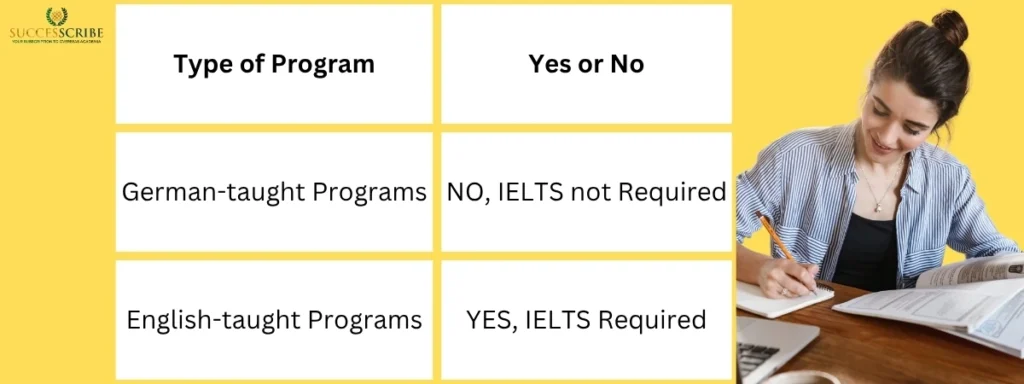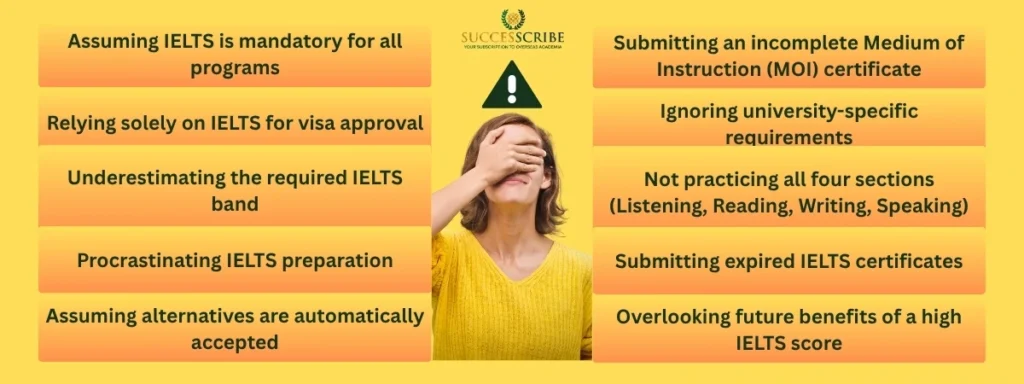Studying or working in Germany has long been a dream for millions of international students and professionals. With over 400,000 international students enrolled in German universities as of 2024, and projections estimating a rise to 500,000 by 2027, Germany remains a top destination for affordable, high-quality education. But one burning question lingers: Is IELTS required for Germany? The answer isn’t a simple yes or no – it’s nuanced, depending on your goals (study, visa, work), program language, and background.
Germany’s appeal? Tuition-free public universities (just €300-€500 semester fees), strong job markets in STEM and business, and post-study work visas up to 18 months. But language barriers can trip you up – English-taught programs number over 2,000, yet proficiency proof is key.
Key Highlights: IETS for Germany
- Is IELTS Required for Germany? – Understand when IELTS is mandatory for study, visa, or work.
- IELTS for Studying in Germany – Role of IELTS in English-taught programs and alternatives.
- Germany IELTS Band Requirement – Typical scores needed for Bachelor’s, Master’s, MBA, and PhD programs.
- Why German Universities Ask for IELTS – Importance of proof of English proficiency for academic success.
- When IELTS May Not Be Required – Exemptions: German-taught programs, prior education in English, MOI certificate, native speakers, alternative English tests.
- IELTS for Germany Visa Applications – Language proof requirements for student, job seeker, work, and language course visas.
- How Much IELTS Score is Required for Germany – Overall and sectional band score expectations.
- IELTS Band Requirements for Top German Universities – Minimum IELTS scores for leading universities.
- Cost and Validity of IELTS for Germany – Fees, validity period, and global acceptance.
- Benefits of Taking IELTS for Germany – Admission, scholarship, visa, internships, and career advantages.
- Boost Your IELTS Score with Successcribe – Training features, mock tests, and personalized study plans.
- Common Mistakes Students Make Regarding IELTS – Pitfalls to avoid during preparation and application.
- Alternatives to IELTS for Studying in Germany – TOEFL, PTE, Duolingo, Cambridge English, MOI certificate.
IELTS for Studying in Germany

The International English Language Testing System (IELTS) is one of the world’s most recognized English proficiency exams. For students planning to study in English-taught programs in Germany, IELTS often acts as proof of English proficiency. When applying to English-taught programs, students frequently wonder, ‘Is IELTS required for Germany?’ Most universities accept IELTS scores to ensure applicants can follow academic courses in English.
Germany offers two main types of study programs:
| Type of Program | Language of Instruction | IELTS Requirement |
| German-taught Programs | German | IELTS not required (German language certificate like TestDaF or DSH is needed) |
| English-taught Programs | English | IELTS may be required (depends on the university and course) |
Germany IELTS Band Requirement: What Score Do You Need?
The required IELTS score is not uniform across all German universities or even all programs within the same university. It is set by the individual university’s admissions office or the specific academic department.
However, based on extensive data from university admissions guidelines, we can identify clear benchmarks. Knowing how many band required for Germany helps you plan your preparation and ensures you meet the eligibility criteria for your desired course.
Typical IELTS Band Requirements for German Universities
| Level of Study | Typical Overall IELTS Band Requirement | Common Minimum Sectional Scores (Listening, Reading, Writing, Speaking) | Notes |
| Bachelor’s Degree | 6.0 – 6.5 | Usually no less than 5.5 – 6.0 in each section | More competitive programs (e.g., at top TU9 universities) may require a 6.5. |
| Master’s Degree | 6.5 – 7.0 | Usually no less than 6.0 – 6.5 in each section | This is the most common range. Technical programs might be at 6.5, while humanities and social sciences often require 7.0. |
| PhD / Doctoral Studies | 6.5 – 7.0 | Varies | The requirement is often set by the supervising professor or the graduate school. A high score is crucial for demonstrating research communication skills. |
| Preparatory Courses (“Studienkolleg”) | 5.5 – 6.0 | Varies | For pathways to English-taught degree programs. |
Why German Universities Ask for IELTS
Germany has more than 380 officially recognized universities, and around 220 of them offer English-taught programs at the Bachelor’s or Master’s level. For these programs, universities require proof that students can communicate effectively in English – and IELTS is one of the most accepted ways to demonstrate that skill.
Universities use IELTS scores to:
- Ensure students can follow lectures, write academic papers, and participate in discussions.
- Maintain international quality standards.
- Evaluate communication skills for global career readiness.
Suggested Post: IELTS score for German public universities
When IELTS May Not Be Required for Germany

Students often wonder, ‘Is IELTS required for Germany?’ The answer is not always — exemptions exist if your previous education was in English, or if you are enrolling in a German-taught program.” There are several legitimate scenarios where you can apply to German universities or for visas without needing to take the IELTS. Here are the most common exemptions. Understanding how much IELTS score required for Germany helps you set realistic targets and plan focused preparation for the exam.
| Condition | Alternative Proof / Option |
| You’re applying for a German-taught program | Show a German language certificate – TestDaF, DSH, or Goethe-Zertifikat |
| You studied completely in English before | Submit a Medium of Instruction (MOI) certificate from your school/college |
| You have a degree from an English-speaking country | IELTS usually not needed (e.g., USA, UK, Canada, Australia, etc.) |
| You’re a native English speaker | Exempt from IELTS; passport may be required for proof |
| University accepts other English tests | Use TOEFL, PTE, Duolingo, or Cambridge English instead |
| Some universities don’t require IELTS | Example: University of Siegen, Kassel, Giessen |
1. You are applying for a German-taught program.
This is the most straightforward exemption. Your focus will be on obtaining a German language certificate like TestDaF, DSH, or Goethe-Zertifikat.
2. Your previous education was conducted entirely in English.
Many German universities waive the English test requirement if you can provide official documentation proving that your qualifying degree (e.g., your Bachelor’s for a Master’s application) was taught exclusively in the English language.
What qualifies as proof?
- A medium of instruction (MOI) certificate from your previous university, stamped and signed, explicitly stating that English was the sole language of instruction and examination.
- Your final degree transcript and certificate may sometimes suffice if they clearly state the language of instruction.
Important Note
This is not an automatic waiver. Each university has its own strict policy on what constitutes valid proof. Some may only accept degrees from specific English-speaking countries.
3. You are a native English speaker
If you hold a passport from a country where English is the primary official language (e.g., USA, UK, Ireland, Australia, New Zealand, Canada), you are typically exempt. However, some universities may still request proof of nationality.
4. You have alternative English proficiency certificates.
IELTS is not the only game in town. German universities widely accept other tests. The main alternatives are:
- TOEFL iBT (Test of English as a Foreign Language)
- Cambridge English Certificates (C1 Advanced or C2 Proficiency)
- PTE Academic (Pearson Test of English)
| English Test | Typical Requirements for Master’s Programs | Equivalent to IELTS 6.5 | Equivalent to IELTS 7.0 |
| IELTS Academic | 6.5 – 7.0 | 6.5 | 7.0 |
| TOEFL iBT | 80 – 100 | 79-93 | 94-101 |
| Cambridge C1 Advanced | Grade C or above | Grade C | Grade B or A |
| PTE Academic | 58 – 76 | 59-75 | 76-84 |
5. You are an EU/EEA national or a spouse of a German citizen.
While this may not automatically waive the university’s requirement, it can simplify the visa process, which in turn reduces the focus on language proofs for entry.
Universities in Germany that May Accept Students Without IELTS
- University of Siegen
- University of Koblenz
- University of Kassel
- University of Giessen
- Free University of Berlin (specific programs)
- University of Kiel
- Nordhausen University of Applied Sciences
- University of Magdeburg
These universities may ask for a Medium of Instruction (MOI) certificate from your previous institution stating that you completed your education in English.
IELTS for Germany Visa Applications

Securing a German student visa (Type D, long-stay) is your gateway – processed at VFS Global or embassies, taking 6-12 weeks in 2025 due to backlogs. Language proof? Mandatory under Section 16b of the Residence Act: You must demonstrate proficiency matching your program’s language. This is where confusion often arises. The German visa process has its own layer of language requirements, which are separate from, but connected to, the university’s requirements. If you’re preparing your visa application, one common question is, ‘Is IELTS required for Germany?’ While not always mandatory, a good IELTS score can strengthen your application and support the visa process.
1. Student Visa (Visum zu Studienzwecken)
For a student visa, the embassy primarily requires you to provide proof that you have met the admission requirements of a German university. This is a crucial link.
- Conditional Admission: If you have received a conditional admission letter that is contingent upon submitting an English language certificate, the visa office will likely require you to provide your IELTS score sheet as part of your application to prove you are fully qualified.
- Unconditional Admission: If you have an unconditional admission letter, it implies the university has already verified and accepted your language proficiency (including your IELTS score). In this case, you simply submit your admission letter, and the visa office will typically not ask for the IELTS test report separately.
In short, for a student visa, your IELTS requirement is generally “passed through” from the university’s admission criteria.
2. Job Seeker Visa / Work Visa
For work-related visas, the focus shifts dramatically towards German language skills, not English.
- Job Seeker Visa: This visa does not formally require German language proficiency. However, having German skills (even A1 or B1 level) significantly strengthens your application by demonstrating a serious intent to integrate. IELTS is almost never required or requested for a Job Seeker Visa.
- EU Blue Card & Work Visa: For these visas, you need a concrete job offer from a German company. The language requirement is determined by your employer. If the workplace language is English, your employer will assess your English skills during the interview. They may ask for an IELTS or TOEFL certificate, but it’s not a mandatory document for the visa application itself. The visa authorities rely on the employment contract as proof of your qualification.
3. Language Course Visa (Visum zum Spracherwerb)
- If you are going to Germany purely to learn German, you obviously do not need an IELTS certificate. You will need proof of enrollment in a German language course.
Suggested Post: Documents required for Germany student visa
How Much IELTS Score is Required for Germany?
The IELTS test is scored on a 9-band scale, assessing four skills – Listening, Reading, Writing, and Speaking.
Here’s a general idea of IELTS band requirements for studying in Germany:
| Program Level | Minimum Overall IELTS Score | Individual Band Requirement |
| Bachelor’s Programs | 6.0 overall | No band less than 5.5 |
| Master’s Programs | 6.5 overall | No band less than 6.0 |
| MBA Programs | 6.5–7.0 overall | No band less than 6.0 |
| PhD Programs | 6.5–7.0 overall | Depends on research field |
We’ve looked at the overall band scores, but understanding the sectional requirements can be crucial for your preparation. Let’s imagine a typical requirement: IELTS 6.5 for an MSc in Mechanical Engineering.
This “6.5” is your Overall Band Score, which is the average of your four individual section scores (Listening, Reading, Writing, Speaking), rounded to the nearest whole or half band.
| Section | Sample Score | How it’s Calculated | Importance for Your Studies |
| Listening | 7.0 | You need to correctly answer 30-31 out of 40 questions. | Crucial for understanding lectures and lab instructions. |
| Reading | 6.5 | You need to correctly answer 26-29 out of 40 questions. | Essential for digesting academic papers and textbooks. |
| Writing | 6.0 | Based on task achievement, coherence, vocabulary, and grammar for two essays. | Vital for writing reports, research papers, and your thesis. |
| Speaking | 6.5 | Based on fluency, vocabulary, grammar, and pronunciation in a face-to-face interview. | Key for presentations, seminar discussions, and oral exams. |
| Overall Band Score | 6.5 | (7.0 + 6.5 + 6.0 + 6.5) / 4 = 6.5 | Meets the requirement. |
What if a university says “IELTS 6.5 with no less than 6.0 in each section”?
In the example above, you would fail this requirement because your Writing score is only 6.0, which meets the minimum, but your other scores are fine. Always pay close attention to these “sectional minimums.”
IELTS Band Requirements for Top German Universities
Universities often specify the minimum IELTS score for Germany, so it’s important to aim for a score slightly above the required band to strengthen your application.
| University Name | Minimum IELTS Score Required | Program Type |
| Technical University of Munich (TUM) | 6.5 overall | Master’s / Engineering |
| Ludwig Maximilian University of Munich (LMU) | 6.5 | Bachelor’s / Master’s |
| RWTH Aachen University | 6.5 | Master’s |
| Heidelberg University | 6.5–7.0 | Master’s (Science/Medicine) |
| University of Stuttgart | 6.0–6.5 | Engineering / IT |
| Humboldt University of Berlin | 6.5 | Social Sciences |
| Free University of Berlin | 6.0 | Humanities |
| Karlsruhe Institute of Technology (KIT) | 6.5 | Engineering |
| University of Bonn | 6.5 | Science / Research |
| Technical University of Berlin | 6.5 | Engineering / Management |
Cost and Validity of IELTS for Germany
Many students wonder how many band required for Germany, the official Germany band requirement, how much IELTS score required for Germany, the ideal IELTS score for Germany, and how much band required for Germany before starting their application process.
| Parameters | Details |
| IELTS Test Fee | ₹17,000–₹17,500 |
| Validity Period | 2 Years |
| Accepted Score Reports | IELTS Academic |
| Accepted by | 10,000+ institutions worldwide, including German universities |
Benefits of Taking IELTS for Germany
If you’re still wondering, ‘Is IELTS required for Germany?’ taking the test can give you multiple advantages, from strengthening your admission profile to improving visa approval chances.
| Benefit | Why It Matters |
| Proof of English Proficiency | Demonstrates your ability to study and communicate effectively in English-taught programs. |
| Stronger Admission Profile | A good IELTS score improves your chances of getting into competitive universities. |
| Visa Approval Support | Helps satisfy German visa requirements for English-taught programs. |
| Scholarship Opportunities | High IELTS scores can increase eligibility for university and external scholarships. |
| Internships & Part-time Jobs | Shows employers you have strong communication skills, improving internship or job prospects. |
| Global Recognition | IELTS is recognized worldwide, giving you flexibility for future studies or work abroad. |
| Confidence in Academic Life | Prepares you to handle lectures, assignments, and presentations in English effectively. |
Boost Your IELTS Score with Successcribe
Preparing for IELTS can be challenging, but Successcribe’s IELTS Classes are designed to make it easier, effective, and student-friendly.
Why Choose Successcribe IELTS Classes?
| Feature | Benefits |
| Expert Trainers | Learn from certified instructors with years of experience in IELTS coaching. |
| Personalized Study Plan | Classes tailored to your current level and target score. |
| Focus on All Four Skills | Listening, Reading, Writing, and Speaking covered in depth. |
| Mock Tests & Practice | Real exam simulations to boost confidence and speed. |
| Proven Track Record | Students achieving 6.5–8.0 bands consistently. |
Even if your program allows alternatives like TOEFL or MOI, taking IELTS through Successcribe can give you a competitive edge for admission and visa approval.
Common Mistakes Students Make Regarding IELTS for Germany

Many students preparing to study in Germany make avoidable mistakes when it comes to IELTS. Being aware of these can save time, money, and stress, and increase your chances of admission and visa approval. Many students mistakenly assume ‘Is IELTS required for Germany’ is always yes, leading them to overlook exemptions, alternatives, or university-specific requirements. Checking the official Germany band requirement for your chosen university is essential to avoid last-minute surprises in your application process.
| Mistake | Why It’s a Problem |
| Assuming IELTS is mandatory for all programs | Not all universities require IELTS. German-taught programs accept German language certificates, and some English-taught programs accept MOI or alternative tests. |
| Submitting an incomplete Medium of Instruction (MOI) certificate | Universities may reject MOI letters that are not stamped, signed, or clear about English as the medium of instruction. |
| Relying solely on IELTS for visa approval | The German embassy primarily considers your university admission letter. IELTS is often just supportive evidence. |
| Ignoring university-specific requirements | Each university sets its own IELTS score requirements. Applying without checking can lead to rejection. |
| Underestimating the required IELTS band | A low score may meet minimum requirements but jeopardize admission to competitive programs. Always aim higher than the minimum. |
| Not practicing all four sections (Listening, Reading, Writing, Speaking) | Weakness in any section may lower your overall score. Universities may look at individual band scores, not just the overall. |
| Procrastinating IELTS preparation | Last-minute preparation can result in low scores or missed deadlines. Start at least 3–6 months in advance. |
| Submitting expired IELTS certificates | IELTS scores are valid for 2 years. Using an expired score may delay or cancel admission. |
| Assuming alternatives are automatically accepted | Some universities may not accept TOEFL, Duolingo, or PTE. Always confirm the accepted English proficiency tests. |
| Overlooking future benefits of a high IELTS score | A strong score not only helps in admission but also in scholarships, internships, and job opportunities in Germany or globally. |
Suggested Post: Best bank for international students in Germany
Alternatives to IELTS for Studying in Germany
For those thinking, ‘Is IELTS required for Germany?’ there are alternatives like TOEFL, PTE, Duolingo, and Medium of Instruction (MOI) certificates accepted by many universities.
| Alternative | What It Is | Score / Requirement |
| TOEFL iBT | International English test accepted by most German universities | 80–90 (depends on university) |
| PTE Academic | Computer-based English test widely accepted | 58–60 |
| Duolingo English Test | Online test gaining popularity in German universities | 95–120 |
| Cambridge English | C1 Advanced or C2 Proficiency recognized by select universities | C1 / C2 |
| Medium of Instruction (MOI) | Official proof that your previous education was fully in English | Stamped & signed letter from your institution |
Conclusion
To sum it up – IELTS is not always mandatory for Germany, but it is highly recommended.
If you are applying to English-taught programs, most universities will expect proof of English proficiency, and IELTS is the most reliable and widely accepted test.
However, if your previous education was in English, or you choose a German-taught program, you may study in Germany without IELTS by submitting alternative proofs like a Medium of Instruction certificate. To answer the question, ‘Is IELTS required for Germany?’ it depends on your program and university. English-taught programs usually require it, while German-taught programs or certain exemptions may allow you to study without it.
FAQs
Is IELTS mandatory for all programs in Germany?
No, IELTS is not mandatory for all programs. It is usually required for English-taught programs, while German-taught programs require certificates like TestDaF or DSH.
Can I study in Germany without IELTS?
Yes, some universities allow students to apply without IELTS if they provide a Medium of Instruction (MOI) certificate, TOEFL, PTE, Duolingo, or have completed education in English.
What is the minimum IELTS score required for Germany?
Most universities require 6.0–6.5 for bachelor’s programs and 6.5–7.0 for master’s programs. Some top programs may ask for higher scores.
How can taking IELTS benefit me even if it’s not mandatory?
A good IELTS score enhances your admission chances, improves scholarship eligibility, supports visa approval, and boosts employability in Germany and abroad.
What happens if I don’t meet the IELTS band requirement?
If your score is below the required band, universities may reject your application or offer a conditional admission with English preparatory courses.
Related Post
How to apply for German universities
Germany university entrance exam
Jobs after masters in Germany
Total cost of masters in Germany















